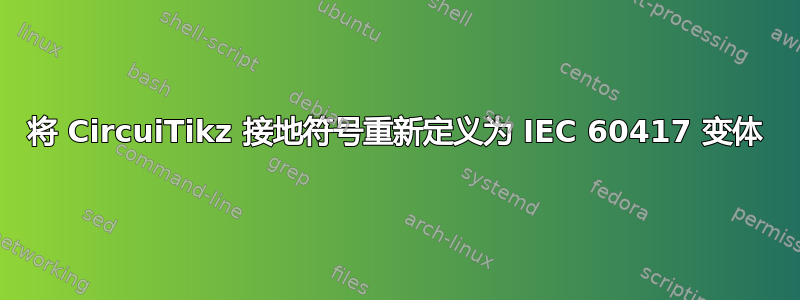
答案1
是的!
我稍微改变了坐标和线宽,使其看起来更相似:
您要求的符号全部都是单极子,它们在文件中定义pgfcircmonopoles.tex。
以下是重新定义的单极子的代码:
\makeatletter
\pgfdeclareshape{ground}{
\anchor{center}{
\pgfpointorigin
}
\behindforegroundpath{
\pgf@circ@res@step=\ctikzvalof{monopoles/ground/width}\pgf@circ@Rlen
\pgfscope
\pgfstartlinewidth=\pgflinewidth
\pgfsetlinewidth{2\pgflinewidth}
\pgfpathmoveto{\pgfpointorigin}
\pgfpathlineto{\pgfpoint{0pt}{-1.2\pgf@circ@res@step}}
\pgfusepath{draw}
\pgfpathmoveto{\pgfpoint{-.6\pgf@circ@res@step}{-1.2\pgf@circ@res@step}}
\pgfpathlineto{\pgfpoint{.6\pgf@circ@res@step}{-1.2\pgf@circ@res@step}}
\pgfusepath{draw}
\pgfpathmoveto{\pgfpoint{-.4\pgf@circ@res@step}{-1.4\pgf@circ@res@step}}
\pgfpathlineto{\pgfpoint{.4\pgf@circ@res@step}{-1.4\pgf@circ@res@step}}
\pgfpathmoveto{\pgfpoint{-.25\pgf@circ@res@step}{-1.6\pgf@circ@res@step}}
\pgfpathlineto{\pgfpoint{.25\pgf@circ@res@step}{-1.6\pgf@circ@res@step}}
\pgfusepath{draw}
\pgfsetlinewidth{\pgfstartlinewidth}
\endpgfscope
}
}
\pgfdeclareshape{nground}{
\anchor{center}{
\pgfpointorigin
}
\behindforegroundpath{
\pgf@circ@res@step=\ctikzvalof{monopoles/ground/width}\pgf@circ@Rlen
\pgfscope
\pgfstartlinewidth=\pgflinewidth
\pgfsetlinewidth{2\pgflinewidth}
\pgfpathmoveto{\pgfpointorigin}
\pgfpathlineto{\pgfpoint{0pt}{-1.2\pgf@circ@res@step}}
\pgfusepath{draw}
\pgfpathmoveto{\pgfpoint{-.6\pgf@circ@res@step}{-1.2\pgf@circ@res@step}}
\pgfpathlineto{\pgfpoint{.6\pgf@circ@res@step}{-1.2\pgf@circ@res@step}}
\pgfusepath{draw}
\pgfpathmoveto{\pgfpoint{-.4\pgf@circ@res@step}{-1.4\pgf@circ@res@step}}
\pgfpathlineto{\pgfpoint{.4\pgf@circ@res@step}{-1.4\pgf@circ@res@step}}
\pgfpathmoveto{\pgfpoint{-.25\pgf@circ@res@step}{-1.6\pgf@circ@res@step}}
\pgfpathlineto{\pgfpoint{.25\pgf@circ@res@step}{-1.6\pgf@circ@res@step}}
\pgfusepath{draw}
\pgfpathmoveto{\pgfpoint{0.9\pgf@circ@res@step}{-1.6\pgf@circ@res@step}}
\pgfpatharc{0}{180}{0.9\pgf@circ@res@step}
\pgfusepath{draw}
\pgfsetlinewidth{\pgfstartlinewidth}
\endpgfscope
}
}
\pgfdeclareshape{pground}{
\anchor{center}{
\pgfpointorigin
}
\behindforegroundpath{
\pgf@circ@res@step=\ctikzvalof{monopoles/ground/width}\pgf@circ@Rlen
\pgfscope
\pgfsetlinewidth{2\pgflinewidth}
\pgfstartlinewidth=\pgflinewidth
\pgfpathmoveto{\pgfpointorigin}
\pgfpathlineto{\pgfpoint{0pt}{-1\pgf@circ@res@step}}
\pgfusepath{draw}
\pgfpathmoveto{\pgfpoint{-.6\pgf@circ@res@step}{-1\pgf@circ@res@step}}
\pgfpathlineto{\pgfpoint{.6\pgf@circ@res@step}{-1\pgf@circ@res@step}}
\pgfusepath{draw}
\pgfpathmoveto{\pgfpoint{-.4\pgf@circ@res@step}{-1.2\pgf@circ@res@step}}
\pgfpathlineto{\pgfpoint{.4\pgf@circ@res@step}{-1.2\pgf@circ@res@step}}
\pgfpathmoveto{\pgfpoint{-.25\pgf@circ@res@step}{-1.4\pgf@circ@res@step}}
\pgfpathlineto{\pgfpoint{.25\pgf@circ@res@step}{-1.4\pgf@circ@res@step}}
\pgfusepath{draw}
\pgfpathcircle{\pgfpoint{0pt}{-0.75\pgf@circ@res@step}}{0.9\pgf@circ@res@step}
\pgfusepath{draw}
\pgfsetlinewidth{\pgfstartlinewidth}
\endpgfscope
}
}
\pgfdeclareshape{cground}{
\anchor{center}{
\pgfpointorigin
}
\behindforegroundpath{
\pgf@circ@res@step=\ctikzvalof{monopoles/chassis/width}\pgf@circ@Rlen
\pgfscope
\pgfstartlinewidth=\pgflinewidth
\pgfsetlinewidth{2\pgflinewidth}
\pgfpathmoveto{\pgfpointorigin}
\pgfpathlineto{\pgfpoint{0pt}{-1.5\pgf@circ@res@step}}
\pgfusepath{draw}
\pgfpathmoveto{\pgfpoint{-1.00\pgf@circ@res@step}{-2.10\pgf@circ@res@step}}
\pgfpathlineto{\pgfpoint{-0.75\pgf@circ@res@step}{-1.50\pgf@circ@res@step}}
\pgfpathlineto{\pgfpoint{ 0.75\pgf@circ@res@step}{-1.50\pgf@circ@res@step}}
\pgfpathlineto{\pgfpoint{ 0.50\pgf@circ@res@step}{-2.10\pgf@circ@res@step}}
\pgfpathmoveto{\pgfpoint{ 0.00\pgf@circ@res@step}{-1.50\pgf@circ@res@step}}
\pgfpathlineto{\pgfpoint{-0.25\pgf@circ@res@step}{-2.10\pgf@circ@res@step}}
\pgfusepath{draw}
\pgfsetlinewidth{\pgfstartlinewidth}
\endpgfscope
}
}
\makeatother
您可以将其另存为 newmonopoles.tex,然后就可以了\input{newmonopoles}。或者,您也可以直接将此代码粘贴到您的 .tex 文件中。
以下是我上面展示的示例文档:
\documentclass{article}
\usepackage{tabularx}
\newcolumntype{C}{>{\centering\arraybackslash}X}
\usepackage{circuitikz}
\begin{document}
\pagenumbering{gobble}
CircuiTi\emph{k}Z versions:\hfill
\begin{tabularx}{0.6\textwidth}{*{4}{C}}
\tikz\draw (0,0) node [ground] {};&
\tikz\draw (0,0) node [nground] {};&
\tikz\draw (0,0) node [pground] {};&
\tikz\draw (0,0) node [cground] {};
\end{tabularx}
\input{newmonopoles}
ISO 7000/IEC 60417:\hfill
\begin{tabularx}{0.6\textwidth}{*{4}{C}}
\tikz\draw (0,0) node [ground] {};&
\tikz\draw (0,0) node [nground] {};&
\tikz\draw (0,0) node [pground] {};&
\tikz\draw (0,0) node [cground] {};
\end{tabularx}
\end{document}




